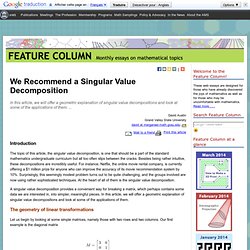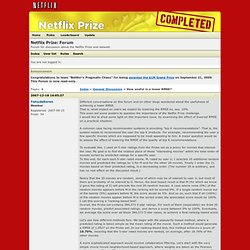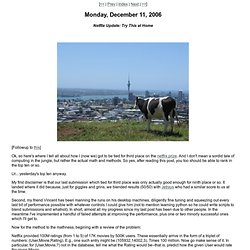

Singular value decomposition. In this article, we will offer a geometric explanation of singular value decompositions and look at some of the applications of them. ...

Introduction The topic of this article, the singular value decomposition, is one that should be a part of the standard mathematics undergraduate curriculum but all too often slips between the cracks. Besides being rather intuitive, these decompositions are incredibly useful. For instance, Netflix, the online movie rental company, is currently offering a $1 million prize for anyone who can improve the accuracy of its movie recommendation system by 10%.
Surprisingly, this seemingly modest problem turns out to be quite challenging, and the groups involved are now using rather sophisticated techniques. A singular value decomposition provides a convenient way for breaking a matrix, which perhaps contains some data we are interested in, into simpler, meaningful pieces. The geometry of linear transformations Now let's look at which produces this effect Ah ha. V. Netflix Prize: Forum / How useful is a lower RMSE? Some interesting dialogue here on different metrics.

I found a good surveypaper once on good collaborative filtering metrics. however, the problem ofpicking the right metric is to a large degree a nonscientific problem. it would bevery difficult to create tests that tend to support one metric over another. I supposeone approach would be to send videos to users based on the different metricsystems and then have them rate their overall satisfaction. you can see the problem, its almost like measuring effectiveness of metrics requires a new metric, a meta-metric. another important point is that different metrics may be optimizing different aspects of the problem, and I highly suspect there is some arrow-theorem (see wikipedia) like result that the different goals that one would like to optimize for are in fact incompatible. but, there is always "diminishing marginal returns" at some point. it seems that netflix is willing to dip their toes in the water, but not jump in.
Netflix Update: Try This at Home svd. [<< | Prev | Index | Next | >>] Netflix Update: Try This at Home [Followup to this] Ok, so here's where I tell all about how I (now we) got to be tied for third place on the netflix prize.

And I don't mean a sordid tale of computing in the jungle, but rather the actual math and methods. So yes, after reading this post, you too should be able to rank in the top ten or so. Ur... yesterday's top ten anyway. My first disclaimer is that our last submission which tied for third place was only actually good enough for ninth place or so. RatingsMatrix[user][movie] = sum (userFeature[f][user] * movieFeature[f][movie]) for f from 1 to 40 In matrix terms, the original matrix has been decomposed into two very oblong matrices: the 17,000 x 40 movie aspect matrix, and the 500,000 x 40 user preference matrix. UserValue[user] += lrate * err * movieValue[movie]; movieValue[movie] += lrate * err * userValue[user]; And finally back to: sum (userFeature[f][user] * movieFeature[f][movie]) for f from 1 to 40.
Svd for humans. Netflix Contest SVD. An improvement of 4.81% over Cinematch at the time of writing. I used a mix of algorithms to get there. The simplest one is based on classifying the movies and then using the ratings of similar movies to make a prediction. Thus to predict the rating for a Movie-User pair (M, U), I compute a weighted average of the ratings of U, for movies that are similar to M (similarity between movies is used as weight). Apparently, in the literature this algorithm is known as k-Nearest Neighbor (thank you Wikipedia!). How does one find a movie's neighbors? Here's the immediate neighborhood of Lord of the Rings: The Return of the King, based on Pearson's r values computed over normalized ratings. Admittedly, this looks pretty bad. Another way to determine neighborhoods is to compute the distances over movie aspects (action, romance, comedy etc.) Here's the closest neighbors of LOTR: Return of the King again, this time based on running Pearson over aspects.
Much better! - The database is quite big. Netflix prize.